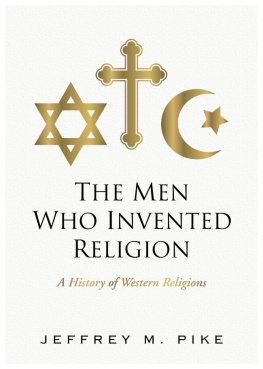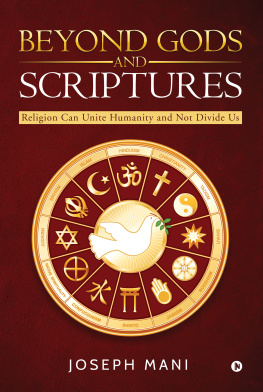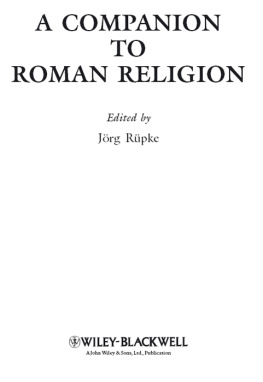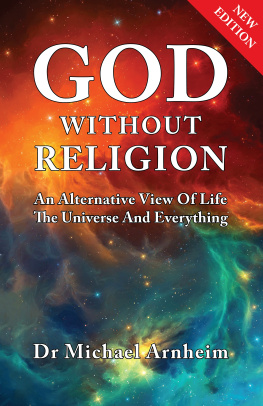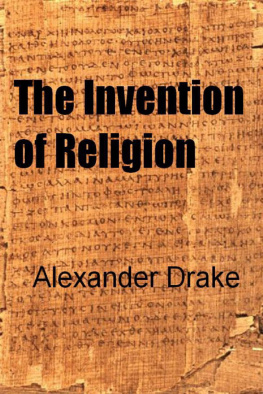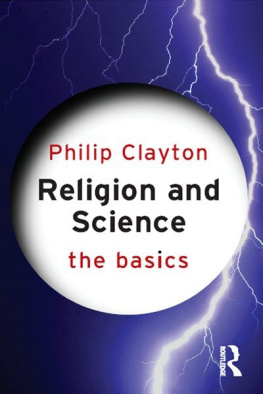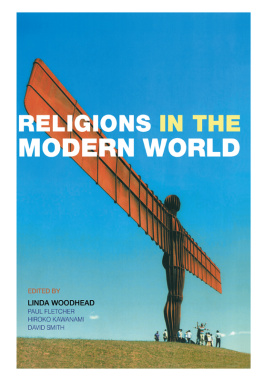
T HE M EN
W HO I NVENTED
R ELIGION
A History of Western Religions

T HE M EN
W HO I NVENTED
R ELIGION
A History of Western Religions
JEFFREY M. PIKE

Copyright Jeffrey M. Pike 2016
The right of Jeff Pike to be identified as the author of this work has been asserted in accordance with the Copyright, Designs & Patents Act 1988.
All rights reserved. No part of this book may be reproduced, stored in a retrieval system, or transmitted in any form or by any means, electronic, electrostatic, magnetic tape, mechanical, photocopying, recording or otherwise, without the written permission of the copyright holder.
Published under licence by Brown Dog Books and
SPP, 7 Green Park Station, Bath BA1 1JB
ISBN printed book: 978-1-78545-113-3
ISBN e-book; 978-1-78545-114-0
Cover design by Kevin Rylands
Internal design by Andrew Easton
Printed and bound by CPI Group (UK) Ltd, Croydon CR0 4YY
Dedicated to Val, Alex
and Millie with love
By the same author
Here Lies the Bible
Pyrolysis WTP
CONTENTS
INTRODUCTION
This book contains nothing about God.
It examines the men and politics behind western religious faith and it may be said that their cynical view of religion has nothing to do with God either
Many believe that they have a need for a simple faith to explain matters that they do not fully understand or seek a way to recognise and celebrate birth, marriage and death. Some 2,500 years ago the Greek philosopher Critias pointed out that this simple faith is a human invention and can be used to frighten people into following moral order. This book describes the personalities who recognised this and who have used religion as a source of power. As it has nothing to do with God it is unlikely to be of interest to the many believers. It has been shown* that when individuals are faced with empirical evidence proving their ideas to be wrong, instead of rejecting them they hold on even more firmly and rationalise away the evidence. As Freud said Religions eleventh commandment is Thou shalt not question.
Freud had some original ideas about religion which are now seen to have been historically correct. He suggested that the start of the three Western religions can be dated to the monotheism of the Pharaoh Amenophis 1V or Akhenaten and the worship of the sun disc Aten. Before this the Middle Eastern population, Canaanites, Israelites and Phoenicians, all worshipped many gods, especially Baal, the son of the supreme god El. Following the escape of the court of the Pharaoh Amenophis 1V from Egypt in about 1350 BC, which incidentally provides the true story of the Exodus, coupled with the development in Palestine from nomadic to settled agriculture, their ideas merged. Only a hundred years after Akhenaten there is the first mention of the Jewish god Yahweh, which derived from a settlement called Yhw of a nomadic people, the Shasu, and there is evidence of gods and settlements sharing names. It is known that the Shasu had settlements in Seir and Edom, so this also accords with the biblical claim of where Yahweh originated. Israel itself is first mentioned on an Egyptian stele celebrating the victories of the Pharoah Merneptah (1224 BC 1214 BC). Surprisingly, the word Jew comes much later and first appears in the Book of Esther, although it may already have been in common usage as the survivors from the destruction of the Temple by Nebuchadnezzar were juhs from the tribe of Judah. Judaism continued to expand, especially in Palestine and Egypt through its success in warfare leading to conversion, sometimes forced, marriage and through population growth with its emphasis on ritual, hygiene, strictures against infanticide and ethical purity.
North of the Mediterranean growth of Judaism was slow although Jewish ideas were well known and quoted, amongst others, by Aristotle and Pythagoras. Hermippus of Smyrna alleged that, if not actually Jewish, Pythagoras held the opinions of the Jews.
Pythagoras was also believed by his followers to be one of the gods who had taken a human body to enable him to come into the world and instruct humanity. Much of the history of Pythagoras agrees with the history of Jesus in that both were natives of Palestine - Sidon and Bethlehem. The father of Pythagoras, as well as the father of Jesus, was prophetically informed that his wife should bring forth a son, who should be a benefactor to mankind. They were both born when their mothers were from home on a journey. Pythias, the mother of Pythagoras, had a relationship with a ghost of the god Apollo, which later appeared to her husband and told him that he must have no connexion with his wife during her pregnancy - a story evidently similar to that relating to Joseph and Mary. Pythagoras was known by the same title as Jesus, the son of God, and his followers thought him to be under the influence of Divine inspiration.
There were many philosophies in Greece including Stoicism and Platonism and agnostic views held by Critias and others including Socrates, but most Greeks recognized the mythical gods of Olympia. By the third century BC these gods had been given factual history which helped in the exportation of Greek ideas, especially following the success of Alexander the Great. Many Jews then became hellenised, some seeing their heroes in terms of the Greek gods and even suggesting that the descendants of Isaac had sailed with the Argonauts. Many cults with different ceremonies or Mysteries developed. St Paul, the founder of Christianity, was himself strongly involved in these Mysteries and went to Jerusalem and, claiming to be a Jew, went to Jerusalem, where he tried to modernise Judaism.
While this book raises the question of whether Paul was in fact a Jew, nobody doubts the Judaism of Jesus himself which then raises the question as to whether Jesus himself was a Christian. As for Islam, while Mohammed was not Jewish he had a number of Jewish connections: his father, Abdullah ben Abdul Muttalib, was the son of a Jewish woman, Halah; his first wife, Khadijah, and a later wife, Safiyya, were both Jews, while his beliefs when in Mecca were clearly taken from his uncle, who was the leader of a Jewish sect that maintained Judaism while accepting that Jesus was the Messiah.
History often asks what might have been?If the Jews had not rebelled against Rome, would Jesus have been the Messiah? If Constantine had not made Christianity the official religion of the Empire, would it have survived? Certainly if his successor Julian had not died in battle, his anti-Christian views might have ensured that it would not. If Mohammed had lost the Battle of the Trench, would Islam have developed?
The growth of Christianity was initially slow but, after some 300 years of state persecution by successive Roman Emperors, Constantine not only reversed the official policy but made it the state religion. This was clearly a political move designed to increase his power, but Constantine himself remained a believer in the traditional Roman pagan gods until his conversion on his deathbed - while he was alive but unconscious. There were many more Jews in the fourth century Roman Empire than Christians and they opposed Constantines decision which he countered by delivering a virulent anti-Jewish speech at the first Synod of the Church in 325 at Nicaea. Antagonism between Christians and Jews continued over the centuries and, as late as 1943, Baron Weizsacker, German ambassador to the Vatican, was surprised at Pope Pius XIIs silence when he was informed of the Nazi atrocities. It was only in 2000 that Pope John Paul II published an apology for the attitude of the Church towards other religions.

